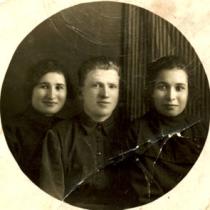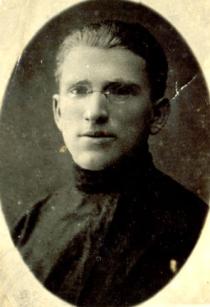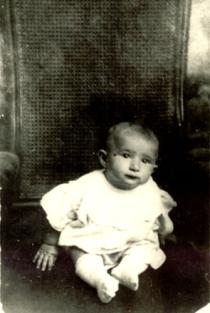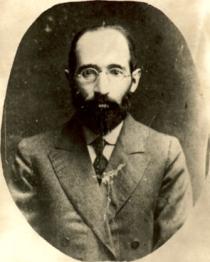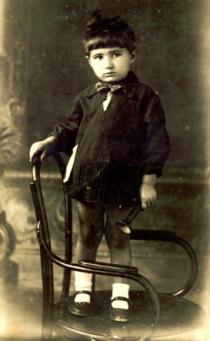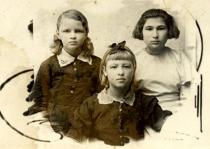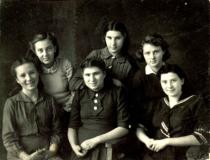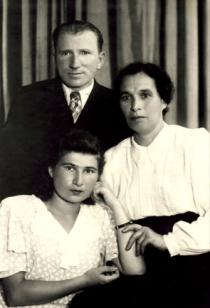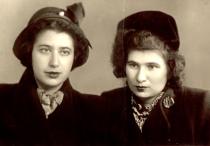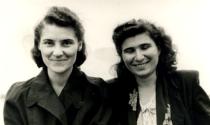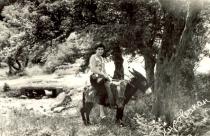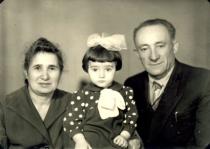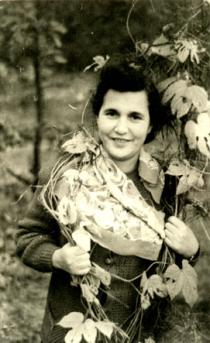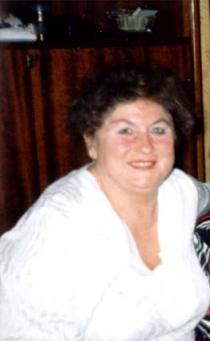
Maya Pivovar
Kiev
Ukraine
Interviewer: Oksana Kuntsevskaya
Date of interview: December 2003
Maya Pivovar is a nice short lady with a short haircut. She lives with her second husband in a small two-bedroom apartment in a remote district in Kiev. She is a very lively woman with a great sense of humor. Maya is a good housewife. Her apartment is in ideal order. She manages all housework by herself despite her age of 76 years. She does the cooking and often bakes pastries – her husband is a hearty eater. She has no children and has dedicated herself to her husband and his children. Maya speaks very correctly and with a good rhythm. She willingly told us about the events of her life.
My mother came from a small town of Narodichi [about 150 km from Kiev] Kiev region. My grandfather’s, my mother’s father, name was Boruch-Benicion Freidman. He was born in 1878. I don’t know where he was born. My grandfather was a teacher of the cheder in Narodichi. My grandmother Malka Freidman, her maiden name was Chuzhaya, was born in 1876. I don’t know where she came from. I don’t know how or when my grandmother and grandfather met. They had nine children: three sons and six daughters. My grandmother was a housewife. My grandmother and grandfather spoke Yiddish. They probably celebrated Jewish holidays, but we didn’t know about it.
I know little about my mother’s brothers. They left Narodichi in the 1920s. –One of my mother’s brothers lived with his family somewhere in the Krasnodarskiy Kray in Russia, another brother was an agronomist and lived in Kherson region, and the third brother lived in the Crimea. They all perished during the Great Patriotic War [1]. We have no information about them.
My mother’s older sister Sophia Min’kovskaya (nee Freidman), was born in Narodichi in 1901. She was the only one of all children to learn Hebrew from her father, my grandfather. She moved to Kiev in 1921 and began to teach Hebrew as a private person. Sophia didn’t have a higher education, but she was well-read. In Kiev she met a Jewish man named Yefim Min’kovskiy and married him. After getting married Sophia was a housewife. Yefim must have had a higher education in economics. Before and after the Great Patriotic War he worked as chief accountant of the Darnitsa railcar repair depot. In 1924 Sophia’s son Alexandr was born. During the Great Patriotic War Min’kovskiy, his wife and son evacuated with the depot to Omsk [Russia, about 3400 km from Kiev]. After the war Sophia continued to be a housewife. She died in Kiev in 1980. Her husband Yefim worked as chief accountant at the plant till he retired. He died in Kiev in 1975, it seems. Their son Alexandr finished a therapeutic Faculty of the Medical College and became a doctor. He lives n Kiev and works in a town hospital now.
My mother’s another sister Ida Freidman was born some time in 1904. I don’t know whether she had any education. In the 1920s she left Narodichi for Kiev and settled down not far from where her sister Sophia lived. Ida went to work as a seamstress at the garment factory. In the late 1920s she married one of my maternal grandmother’s distant relatives. His name was Solomon Chuzhoy. Ida had a Jewish wedding with a chuppah. My mother laughed talking about Ida’s wedding. She said Ida was already pregnant, when she was getting married, and either my mother or Sophia were standing under the chuppah on her wedding since it was an unsuitable situation with this pregnancy. In 1939 Ida’s husband was sent to work in Rovno [324 km from Kiev], when after the division of Poland [2] the Western Ukraine was annexed to the USSR. He was chief of the trade department in the regional executive office [3]. After moving to Rovno Ida was a housewife. They had two children: a son and a daughter. Ida’s husband was a soldier at the front line during the Great Patriotic War, from the first to its last day, and was at the avenue of approach to Berlin, when the war was over. Ida and their children evacuated somewhere to the Volga, to the town of Engels, I guess. She worked at a bakery there. After the Great Patriotic War her husband, Ida and the children returned to Rovno. He continued to work as chief of trade department. Ida was a housewife taking care of the children and the house. Her husband died in 1977. Ida died at the age of 89 in 1993.
Ida’s son Alxandr and I were of the same age and we were close friends before the Great Patriotic War. Our relatives even wanted us to get married, but I didn’t want to marry him. He finished a college in Rovno, I don’t remember, which one. He worked then as chief of the inter town telephone station. Now he lives in Germany with his family. They left in 2002. His younger sister Bronia finished the Polygraphist College in Kiev and stayed to live here. She was chief of technical editor office of some magazine. She didn’t have a family. She died in April 2003.
My mother’s sister Fania Freidman, born in 1910, also left Narodichi some time in the 1920s. Se went to work at the knitwear factory in Kiev. She was a common worker there. Later she entered and finished the extramural Faculty of Economics of the Textile college. She was chief of the planning department of the knitwear factory. She was single. She died in Kiev in 1990.
My mother’s sister Genia Freidman, was the prettiest. She was born in Narodichi in 1912. She was an accountant. Genia didn’t have a higher education. She finished a secondary school and a course of accountants and worked as an accountant, but I don’t know where she worked. Genia got married before the Great Patriotic War. Her husband’s name was Yakov Gol’man. He had some medical education, since when the Great Patriotic War began, he was mobilized to a hospital. Shortly afterward Genia and her husband followed the hospital to Kharkov. Then my mother’s younger sister Lisa joined them there and they all evacuated to Krasnoyarsk in late 1941.
From Krasnoyarsk Yakov was sent to a training course in Omsk and he was supposed to go to the front. My mother’s older sister Sophia and her family were in the evacuation in Omsk. Before departing to his military unit Yakov visited her and complained to her of a pain in his stomach. Sonia advised him to go to see a doctor, but he replied: ‘You know, I am about to be sent to the front, and if I start complaining, it will look as if I am trying to get out of it’, and from them he left for the unit where he was to take a course of training. Some time passed and there was no news from Yakov. Sophia was worried and went to his military unit somewhere in the suburbs of Omsk. When she arrived there they said: ‘He died and we buried him’. What happened there was that Yakov had a ulcer and there was another attack of it and he was operated on. It was cold in the hospital and he was coughing, at least, this is what they told, and his seams opened. Some time later Genia and her younger sister Lisa moved to Omsk to Sophia. After the Great Patriotic War Genia returned to Kiev and worked in the regional committee of trade union of builders in Kiev. She was agreeable and pretty and everybody liked her, but she never remarried and she had no children. In the early 1950s she fell ill and died in 1953.
My mother’s youngest sister Lisa was born in Narodichi in 1918. She moved to Kiev with her parents in the late 1920s. My grandmother and grandfather moved in with their oldest daughter Sophia and her family. When in 1939 Ida and her husband moved to Rovno, grandmother and grandfather and Lisa moved into her apartment and lived there before the Great Patriotic War began. In Kiev Lisa finished a secondary school and entered the Faculty of Economics of the Light Industry College. She defended her diploma on the second day of the Great Patriotic War, on 24 June 1941, and got a job assignment to [3] Poltava. She didn’t work there long since the Germans were advancing. Genia was in Kharkov with her husband. Genia convinced her to evacuate to Krasnoyarsk with her family. After her husband perished Genia and Lisa moved to their older sister Sophia in Omsk. About 1942 their cousin brother on my grandmother’s side. I don’t remember his name, but his surname was Chuzhoy. Later he married Lisa. In Omsk Lisa’s son Arkadiy was born in 1943. After the Great Patriotic War Lisa, her husband and their child returned to Kiev and lived with us for some time. Lisa had a hard life. Her husband finished an extramural department of a Law College and worked as a lawyer at the Darnitsa railcar repair depot, but he must have had a mental disease since he committed suicide in the 1960s. Their son Arkadiy had poor sight since childhood. His parents decided that it was best for him to become a teacher of history. Arkadiy graduated from the History Faculty of the University, when he was totally blind. Lisa and other women, whom they paid, read to him, and they mainly read the first sources to him. Arkadiy was well developed. He taught in schools at first, but then he fell mentally ill. He had all diseases imaginable: schizophrenia, diabetes, anything one could imagine. He died in 1999, I guess, and then Lisa died in 2000.
My mother Buzia-Rivka Freidman was born in Narodichi in 1902. She left Narodichi at the age of 17 looking for a better life. I don’t know what she was doing before her departure to Kiev. My mother hardly told me anything about her life. In Kiev my mother entered the rabfak [5]. She worked as a tutor in Kiev Jewish children’s home and later she went to work at the garment factory in Podol [6]. My mother met my father at the rabfak.
My father’s name was Mikhail Pivovar. He came from Kornin Zhytomir region [about 160 km from Kiev]. My father’s parents died from some disease and hunger in 1919. I don’t know exactly where this happened. All I know about them is that my grandfather’s name was Yakov. My father had eight brothers and sisters, but I have no information about them and don’t even know their names. My father was the youngest. He was born in 1904. He finished four years of the Russian state school in Kornin. There was an annual quota in this school for one Jew to be admitted each year. My father managed to enter this school and finish it. My father was 15 years old, when his parents died. He had to earn his living somehow. He became a teacher. So, in 1919 he was a teacher. My father traveled from one village to another where he had pupils who were children of wealthier farmers, or kulaks, [7] as they were called at the time. He taught them to read and write in Russian. Then he moved to Kiev. I don’t know how it happened or why, he probably told me, but I don’t remember. My father entered a rabfak school and worked as a clerk in the regional pharmacy department. My father was a very nice person and a very sociable one. Everybody liked him. He met my mother in 1925 and they got married. They didn’t have a traditional Jewish wedding. They were the children of their time and didn’t observe any traditions. My parents lived not far from where my father was working, in the center of the city, in a communal apartment [8] with neighbors.
My father worked in the regional pharmacy department till the middle 1930s, I guess, before he went to work at the Kiev experimental institute of endocrinology. He was production manager. In Ukraine, and probably in the USSR there were two such institutes: one in Kharkov and one in Kiev. My father finished the extramural department of the Pharmaceutical College in Kiev. In 1941 he failed to take state exams due to the war and he never obtained a document about graduation from this college. My mother continued to work at the garment factory where he was promoted to the position of a forewoman and she earned well already. My parents earned well and we were a family of an average wealth. We didn’t live in luxury, but we were not needy either.
I, Maya Pivovar, was born in 1927. I was born and grew up in Kiev. I didn’t have a nanny. I went to the kindergarten, but there was a period of time, when I didn’t go to the kindergarten, and my mother and father had to go to work. There was a woman in our house, who had a group of 5-6 children in her care. She told us something, I don’t remember. She was called ‘frebelichka’ tutor and she had finished a Frebel school [9].
Our family didn’t celebrate Jewish traditions. My parents were members of the party and atheists. In 1926 my father joined the Communist Party. My mother was a member of the communist Party since 1932. Our family spent our leisure time like many other Soviet families. My mother’s relatives visited us – they were a big family. We got together on birthdays, on Soviet holidays and new Year. Of course, we went to the theater and to the cinema. I remember the theater of Red army in Merngovskaya, present Zankovetskaya, Street, and the Children’s Theater in Karl Marx Street. Once all school children went to the theater. I don’t remember what we watched, but I remember having bought an ice cream during an interval. It was wrapped in cellophane paper. I didn’t finish my ice cream during the interval and was still having it, when the performance started. I was a brought up child and couldn’t throw the cellophane under the chair, so I ate it slowly…
My father took me to the first form: my mother was working. This was an ordinary Russian school, the nearest to our home. There were no school uniforms. I remember as if it were happening now – I was wearing a white dress in blue polka dots. The desks were freshly painted, and the paint had not got dry. I sat down in my white gown and stuck to this chair! Fortunately my father was still there and brought me another dress to change. I studied well and enjoyed it. I was good at all subjects. There were 40 children in my class, there were also Jewish children, but we never gave it a thought then, we were friends, ran to the beach in summer, played with a ball and there was no segregation before the war.
We lived with our parents in a huge communal apartment before the Great Patriotic War. There were five other families living there. There was a big kitchen in the end of a long corridor. There were six tables in the kitchen, one table belonged to each family living in the apartment. There must have been a stove, but I don’t remember. Each family had a primus stove [Primus stove - a small portable stove with a container for about 1 liter of kerosene pumped into burners]. There was no gas then. Gas appeared after the war. We had two rooms in the very beginning of the corridor. There used to be steam heating in this house in the past, but when I remember, for example, in 1932, there was no steam heating. There was a small stove and smoke from it was crawling to a neighbor’s apartment across the room: there were no chimney flues that were not necessary for steam heating. Probably, there was a smoke duct in another apartment, there was a tube going there and it dipped, this was such nuisance! I remember somebody brought potatoes to my father and it was dropped on the floor. I and our neighbors’ children used to bake these potatoes in a small oven. We had plain furniture: a desk, a divan with a high back and a cupboard. There was plain crockery. There was a plate-shaped radio hanging almost under the ceiling on the wall. We liked listening to the radio: there was always merry music on it. The desk was right beneath this radio plate and when there was an interesting program, I got onto this desk to be closer to radio to listen to the program.
I remember famine [10]. Our family hardly suffered from the famine. My parents received some miserable food packages each on his work. There was no sufficient food, but enough to not die from hunger. In 1932 starving people were escaping to towns from villages. There was bread sold at markets in towns, but it was impossible to buy any food in villages. Somehow those people managed to get some money to buy bread, they ate it and were dying in the streets. I remember I was 5 in 1932, I was sitting on the window sill in our apartment and saw how they were loading something on a truck. There was a club of homeless children across the street from our house. I didn’t understand then what they were loading, but now I know those were corpses. Starved exhausted people came to this club where they could get some food. They ate it and died. From overeating.
I had finished seven forms before the Great Patriotic War. As far as I can remember, my parents were talking about a war somewhere abroad, but this seemed to me to be far away from where we lived and was not going to happen to us. I don’t think my parents realized how serious this was, or they wouldn’t have allowed my grandfather and grandmother (on my mother’s side) to stay in Kiev when Germans came. I remember well beginning of the war on 22 June 1941, I was already 14 years old. We were on vacations and were walking with our neighbor in a park, it was in the morning and she said: ‘They say, they were dropping bombs at night on the Post-Volynskaya station out of town’. His was something wild to me: bombs in peaceful time! We went home, and at 12 o’clock in the afternoon Molotov [11] spoke on the radio, he announced that the war began. My father was a reserve officer and he had to make his appearance at the military registry office in case of war. He went to the registry office on Monday and they told him to pack his luggage and come to an induction center. Then somebody told us that the recruits had not been sent to the front and were waiting at the railway station. My mother and I took his coat, it was still cold at night, and went to see him. We met with him. My mother was working at the factory round the clock. She sent me to my grandmother and grandfather since I was on vacations. When the time came for my mother and me to evacuate she was trying to convince her parents to come with us. My mother and I were the last of the family to leave Kiev. But they didn’t want to leave. My grandfather as ill. He seemed to be old to me, but he was only 63 years old. He said: ‘I am going to die on the way. I want to die in my bed’. If only we had known that our army would leave Kiev. We would have been more insistent, but since we weren’t, they stayed and perished in Babi Yar [12], but we only heard this from our neighbors in 1944.
My mother and I evacuated with my mother’s factory where she was working on a barge in July. The factory products were dumped into the hold of the barge and we were sitting on those bales. We were heading to Dnepropetrovsk [500 km from Kiev]. It was believed that Germans didn’t bomb Dnepropetrovsk as much as our town and that factories could operate there. To describe our trip on those bales in the hold, I would give an example. One night I woke up having the feeling of suffocation. Somebody’s leg in a boot was on my chest. I tried to throw down this leg, when a man’s voice said: ‘Why are you pulling my leg?’ This happened to be a man stretching his legs to feel more comfortable.
When we arrived in Dnepropetrovsk, we were not allowed to get off: there were two lines of military men, and they made us board some freight railcars for transportation of coal – there were no roofs in them. We moved on we didn’t know where. It was pouring with rain, we got black from coal dust all over. I don’t remember how long the trip was: two or three days… At night we were told to get off. In the morning we were taken to a kolkhoz [13]. It turned out we were in Krasnodarskiy Kray. Starominskaya village [over 1000 km from Kiev]. We worked in the kolkhoz there till another party of workers of the factory evacuated to Zlatoust town [about 900 km from Kiev], and we were taken there. We changed few freight trains for transportation of cattle to get to Zlatoust. The conditions were terrible. Our trip probably lasted five days. This was a beginning of the winter 1941.
In Zlatoust we were accommodated in local apartments. The owners of the apartment where we accommodated, an elderly couple, were nice people, and they treated us kindly. My mother continued to work at the factory that worked for the needs of the front: they made military overcoats, uniforms and tents for the front. I went to the local school but gave up my studies very soon to go to work at my mother’s factory. We didn’t hear from my father and were very concerned about him at the time.
My father was in the 5th Army. At the very start of the war he was wounded and sent to a mobile field hospital. In the fall this Army got in encirclement somewhere near Kiev. When it became clear that they were in encirclement chief of the hospital said to the patients and personnel of the hospital: ‘Drift apart! By whatever means drift apart!’ My father told us later that he was in a field with a group of military. They were lying in hiding. Germans encircled the field and shouted: ‘Russ, surrender!’ Someone lying beside my father said: ‘Why lying here, I will surrender!’ My father didn’t know what happened to him. Then Germans sent tanks onto the field. My father said one tank drove beside him on one side and another tank – on his other side, in few centimeters that saved his life! He stayed in the field till dark and then he came to a village where people gave him some civilian clothes. He was 37 years old, but the children in the village said: ‘God, what a scary looking old man!’ He wasn’t shaved and he was thin after he had been wounded. My father was going from one village to another till he reached the front line that was along a river. One villager was bringing soldiers from encirclement across the river on his boat. The boat was small and they were taking turns to go across the river, when somebody ran from the village shouting that German troops were already coming to the village! ‘You may be punished for this!’ but the villager said he would remain till he transported all those waiting for his help. And indeed, he transported all troopers.
My father was in encirclement 18 days. Later he had problems in this regard. Near Kharkov. He was looking for a toilet at the railways station. He went to and fro once, then another time, when somebody paid attention to him. They took him to the commandant’s office. My father didn’t have any documents with him and had civilian clothes on. They decided he was a spy, but he managed somehow to get out of it. The group of military who had been in encirclement with my father gathered in Kharkov. They were sent for retraining in the Ural. Then my father was sent to the Moscow Front and was wounded in January 1942. His right arm didn’t function and he had lost thee fingers on his left hand. My father was sent to a hospital in Novosibirsk [about 3000 km from Kiev]. When he was released, he decided to look for my mother and me. From my grandmother and grandfather’s letters my father knew that we were in Krasnodarskiy Kray, but we had moved to Zlatoust before then.
When my father was being released from the hospital in Novosibirsk, the chief doctor of the hospital, hearing that he had worked in the Institute of Endocrinology before the Great Patriotic War, advised my father to go to Biysk town where the Kiev and Kharkov institutes of Endocrinology had evacuated. But my father decided to first go looking for my mother and me and asked that they gave him a ticket to Krasnodarskiy Kray. Biysk town was near Novosibirsk and my father visited it on his way. There he was told that his Institute had moved to Frunze [about 3000 km from Kiev]. My father went to Buguruslan where there was an evacuation information agency where he submitted the information about his and my mother’s relatives. Of all our family he got the address of my mother and me in Zlatoust from this agency. He came to Zlatoust and we all moved to Frunze. In Frunze we first accommodated in a club building till my father rented an apartment for us. Our main food was bread and vegetables, but we didn’t starve, actually. I hardly saw any local residents there. It happened so that in the center of Frunze where we lived, there were mainly those who came in evacuation. Several times we, schoolchildren, were sent to pick potatoes where I aw the locals. They could hardly speak Russian, those, whom I saw, but they were quite friendly.
In Frunze my father was chairman of the local committee [14] of the institute trying to make the life of employees of the institute easier. For example, he found a jobless shoemaker and the management of the institute managed to get pieces of leather, and this shoemaker fixed employees’ shoes. It was important during the war! My father also made arrangements for opening a canteen for employees at the institute, and my mother went to work there as a cook.
I finished the 8th and 9th forms at school in Frunze. I hope you don’t think that we, school children, didn’t do anything during the war! One day a week at school was a work day. We worked at the construction of a railroad spur. Military plants were evacuated to Frunze. Of course, we were silly. I remember competing who carried more soil on a barrow. Two girls, besides, we were 15-16 years old, carrying this heavy barrow curving under the heavy load. A man passing by said: ‘Girls, what are you doing? You better take two trips than carrying such heavy barrow!’ And then construction of the Chuyskiy channel! The builders were preparing the pit for concreting – this was going to be the Chuyskaya hydro power station. There was not enough workforce, and the construction management organized a Komsomol group of young people. We, school children, were sent to the construction of this channel for 10 days during vacations. We were to carry soil up the slope. I remember working with a teacher. She was probably about 5 years older than me. She, poor thing, was not used to this kind of work. And I got angry with her, it was hard for me to work with her! So, when we had the barrow loaded I was dragging it along with her. I thought, the quicker I got to the top, the easier it would be for me. Later I carried the barrow with a boy from the tenth form. He was pushing the barrow and me up the slope – this was better.
In 1944 my parents and I returned to Kiev, but we had no place to live. Kiev was liberated on 6 November 1943 and our house got burned on 5 November. It was hard. Though my father was an invalid of the war and had the right to receive a dwelling, he was not that kind of a person who knew how to get what was his due. The institute of Endocrinology helped us. When the institute received a building from the town authorities, we also got a little place there. There were two rooms where two families lived. In the late 1940s the institute restored a small house near the Victory Square. Director of the institute received two rooms in a communal apartment in this house, but he got another apartment in a short time, and let my father have these rooms.
My father worked at the Institute of Endocrinology, and my mother worked at the factory. They worked from morning till night, left home early in the morning and came back late at night. My mother also had to cook. There were no fridges. She cooked soup or borsch in the morning and left the pot in the corridor, in the darkest, and coolest spot accordingly, and our old neighbor fished for pieces of meat in it.
In the late 1940s – early 1950s almost all of my mother’s relatives went through our apartment. They were returning from evacuation and didn’t have a place to live. Lisa, her husband and child lived with us, then Genia, and Fania. Later they all received some kind of dwellings, but they continued to keep in touch and meet like they did before the war. My parents got along well. Though they didn’t observe Jewish traditions, they spoke Yiddish among themselves. I can say this was their native tongue. I understood what they were saying. I feel ashamed though, that I still cannot write or read in Yiddish. Maybe it’s my fault, maybe theirs. Even though my grandfather was a teacher in the cheder. Though we lived separately from my grandfather and grandmother.
In the early 1950s gas piping began to be installed in Kiev. My mother’s sister Genia lived in the center of the city, and they had gas supplies before it was arranged in other districts of Kiev. I remember her telling excitedly: ‘You take a pot off the gas stove and can put it right on a white tablecloth – and it won’t get dirty!’
When we returned to Kiev from the evacuation I entered a preparatory course at the Polytechnic College and concurrently I was finishing a secondary school. In 1945 I received my school certificate. We took exams upon finishing school and the results were accounted for during admission to colleges. I entered the Chemical Technological Faculty, department of paper and cellulose, of the Polytechnic College. I didn’t have any problems with admission. I was just lucky. It was quiet in 1945. Since I had finished a preparatory course, I was admitted to the college almost automatically. In this regard everything went well. I remember how we, students of the preparatory faculty had to work at making wood stocks near Kiev for a month. I have no idea, whose direction this was. We cut trees, sawed them and stored in the store metering boxes. The most ridiculous of this was that all students of the preparatory faculty were supposed to go there, but they didn’t actually. Those who stayed in college continued having classes and when we, the enthusiasts, returned, we had to catch up with those who were staying. However, I recall this time as a very romantic period. We lived in tents, baked potatoes in the open fire in the evenings, it was fun. Then it seemed there was going to be nothing bad in life, and the most scaring thing – the war – was in the past. I was the only Jew in my group and in college. Still, everybody treated me well and we still call each other and meet with my fellow students. I had Russian and Ukrainian friends. It took me a short time to catch up with my fellow students after this event with making the wood stocks. I cannot say that I had only excellent marks, but I wasn’t among the worst students. I liked to go to the cinema and theater and I particularly like the Russian Drama Theater. I often went there with my parents and friends. I read a lot. I read classics and modern Soviet literature.
After I finished the college in 1950 I got a job assignment to the Kamskiy cellulose and paper factory in Perm region Krasnokamsk town [over 3000 km from Kiev]. I worked there 7 years. I took part in public life. In Krasnokamsk I joined the party. It somehow happened there. I knew this was good for my career, but I actually didn’t have anything against the party. We were raised patriots and we piously believed in communism and its ideology.
The events in the early 1950s, the doctors’ plot [15] had no impact on me whatsoever. I was in Krasnokamsk and things were quiet there. Well, actually, there was chief engineer, a Jew, Rappoport, in 1952 they reduced him in his position appointing him production manager, and the former production manager was appointed chief engineer. I think they did it for a show to demonstrate that they responded to the events happening at the time. At meetings this new ‘chief engineer’ was sitting beside the new ‘production manager’ asking him one ach issue ‘What’s your opinion?’ Since Rappoport was more qualified, of course.
The echo of the doctors’ plot had its affect on my father at the institute of Endocrinology. My parents never told me what actually happened. I only know that there was a big problem, they had fabricated a case and my father didn’t work for a year and a half. Then he went to the pharmacy department where he had worked in the 1920s asking for help. They employed my father in the prescription department in a pharmacy. My father retired in 1970.
I liked working in Krasnokamsk very much. There were common nice people there. I made many friends. We had a good time together, went to the woods to pick berries and mushrooms, baked potatoes, sang songs to the guitar, but my mother rebelled and said: ‘That’s enough. A little bit of good at a time is enough. Resign and come to Kiev’. In 1957 I quit and returned to Kiev to my parents, but here I faced a problem: I couldn’t obtain a residential registration [16] in our apartment. I couldn’t get employed since I was not allowed a residential registration and couldn’t obtain this residential registration without having a job.
Somebody mentioned to me that a friend or a relative of my deceased grandfather lived in Boyarka near Kiev and I could get a residential registration to live in his house. We went to Boyarka and I had this registration there. We paid a monthly fee for this registration, but I still couldn’t find a job. I kept looking for a job for a year. Once my co-student’s mother came by, her husband worked in the Polytechnic College, he was chief of department of organic chemistry. The Soyuzreactiv office rented a facility on the territory of this department. They organized a laboratory of reagents and my friend’s father said to his wife: ‘Tell Maya if you happen to go past their house to come over here’. He introduced me to the future manager of this laboratory. The manager took me to supervisor of the Soyuzreactiv office and I became his first employee! I had absolutely nothing to do with organic synthesis: I had finished the chemical technological faculty, but I dealt with paper! I remember this supervisor taking my passport looking at my residential registration in Boyarka. He said: ‘So what, your Mom and Dad could not arrange a registration for you in their home?’ I said: ‘No, there was no permission!’ Basically, he employed me. At first I worked in the laboratory of reagents and when the factory of reagents was built, I went to work there.
My parents and I went on living in our apartment in Decabristov Street till in 1970, in summer during a terrible rain storm the Victory Square was flooded and there was water in our apartment 60 cm deep. I woke up hearing the water babbling in the room. I awakened my parents, they got up and their sofa sailed across the room. Then we received a three-bedroom apartment in Borschagovka (the most remote and the least prestigious district in Kiev) and lived there.
My mother retired in the late 1950s. She became a housewife. She was ill for a long time. I had to retired in 1982 due to my mother’s illness, or I would have continued to work. My mother died in 1983, but I never returned to work. My father’s sight got much worse when he grew older and he felt ill from his wounds, but he was a sociable man and had to do something. My father asked chairman of the Party veterans association to give him a task to do. Being an invalid of the war, my father could do his shopping for food in a special store for invalids of the war [in the USSR there was a network of special stores for veterans of the war, and veterans having a special certificate could do their shopping there. Once a month they could buy a food package including deficit products such as: mayonnaise, buckwheat, tinned fish, smoked sausage that were not available in ordinary stores]. Veterans of the Party also did their shopping there. Chairman gave my father the list of veterans, their phone numbers and authorized him to make phone calls to tell them when food packages were ready. My father could receive his package before everybody else being an invalid of the war, but since he was blind, I was his ‘secretary’. Father died in 1996.
I got married at the age of 59. My husband Yefim Karpinskiy, a Jew, was born in 1916. Before retirement he worked in the Institute of Electric Circuits. He was chief specialist in power supply network in the town. Yefim became a widower few years before we met. We had no wedding party, we just decided to register our marriage in a registry office and began to live in my apartment, in perfect harmony, and we never said a rude word to one another. I hardly knew anything about my husband’s family. We lived together for too little time, only a year and a half. He died from stroke in 1988. I didn’t remarry for two years, but I had a very good husband and I liked being married. I talked to my friend. Her husband had many friends. I said to her: ‘Perhaps, there is some product in no demand around?’ (laughs). The wife of my current husband, a Jew, Yefim Volodarskiy, had died. My friends introduced us to one another. She is now in Germany. When she writes me, she always reminds us who we owe for our happiness. I liked Yefim. He was a very sensible and educated man. He had worked as leading engineer at different plants. By the time we met, he was a pensioner. We had a lot of free time and we walked and went to theaters. We lived together for three years before we decided to get married. Thank God, we’ve been together for ten years already. We live in harmony and even merrily. Yefim has a wonderful sense of humor, he has a joke for each unpleasant event in life and then we stop brooding and begin to laugh. This helps very well in life. I wasn’t good at cooking before, but now I can cook gefilte fish and sweet and sour meat. It is for my husband. I try to cook something of Jewish cuisine every Friday. We don’t observe any other traditions. Every week my husband’s younger son Alexandr and his family visit us. They live nearby. My husband and I worry about them when they have problems and try to help, and share their joy when they tell us about their successes. We used to have guests go went out to see my husband’s colleagues and my colleagues. We got together on Soviet holidays, New Year and birthdays, but for the recent six years our life has quieted. We and our friends have grown older. My husband and I hardly go out, but we stroll around the house every day. We rarely read fiction. Yefim occasionally quotes a poem in Yiddish, he know Jewish literature wonderfully. We mainly read Ukrainian newspapers, like to watch news on TV and discuss this for sure. We occasionally play cards. I’ve never been abroad or considered emigration, and I would like to visit far away countries, but we cannot afford it. There is much interesting on TV, so we watch it. I wouldn’t want to depart for good. However bad it may be here, but it’s best at home. Who needs us elsewhere?
I didn’t quit the Party. When I was a pensioner, I continued to pay monthly fees. Some time in 1990 I guess, our, former already, Party unit secretary brought me my record book – the Party was dismissed. My membership was over, but I do not consider myself a real communist. Now I am aware that I had joined the Party since it was believed to be an outstanding deed, it was good and prestigious for a career. It was my father who was a real communist. He piously believed in the bright future for all workers and tried to do only good. At first I wasn’t quite enthusiastic about perestroika [17]. Everything seemed to be ruining. The first thought was – that’s it, I will not travel to the Caucasus since it’s a different country now. Then this confusion in the economy! But now – I don’t know, as long as the children will get used to the new system, as for us – as long as everything is fine with them!
Of course, I can feel that I belong to the Jewry. It’s bad that I didn’t know anything about our culture and traditions. I feel sorry for not having talked with my grandfather, my mother’s father, about the history and the Torah. I was too young, but I still remember how carefully my youngest aunt Lisa’s friends were listening to him. Now there are many Jewish organizations arranging interesting lectures about the Jewish people and traditions, and my husband and I can borrow books and read them with interest about our people from whom we’ve been apart for so many decades. Hesed provides assistance to us, giving food and providing medications, it’s sufficient assistance. Now, of course, we know more about our culture and holidays, but my husband and I do not celebrate them strictly following the rules, but we sometimes light candles on Friday and we know about holidays and are sure to give our grandchildren coins on Chanukkah.
GLOSSARY:
[1] Great Patriotic War: On 22nd June 1941 at 5 o’clock in the morning Nazi Germany attacked the Soviet Union without declaring war. This was the beginning of the so-called Great Patriotic War. The German blitzkrieg, known as Operation Barbarossa, nearly succeeded in breaking the Soviet Union in the months that followed. Caught unprepared, the Soviet forces lost whole armies and vast quantities of equipment to the German onslaught in the first weeks of the war. By November 1941 the German army had seized the Ukrainian Republic, besieged Leningrad, the Soviet Union's second largest city, and threatened Moscow itself. The war ended for the Soviet Union on 9th May 1945.
[2] Annexation of Eastern Poland: According to a secret clause in the Molotov-Ribbentrop Pact defining Soviet and German territorial spheres of influence in Eastern Europe, the Soviet Union occupied Eastern Poland in September 1939. In early November the newly annexed lands were divided up between the Ukranian and the Belarusian Soviet Republics.
[3] Ispolkom: After the tsar’s abdication (March, 1917), power passed to a Provisional Government appointed by a temporary committee of the Duma, which proposed to share power to some extent with councils of workers and soldiers known as ‘soviets’. Following a brief and chaotic period of fairly democratic procedures, a mixed body of socialist intellectuals known as the Ispolkom secured the right to ‘represent’ the soviets. The democratic credentials of the soviets were highly imperfect to begin with: peasants - the overwhelming majority of the Russian population - had virtually no say, and soldiers were grossly over-represented. The Ispolkom’s assumption of power turned this highly imperfect democracy into an intellectuals’ oligarchy.
[4] Mandatory job assignment in the USSR: Graduates of higher educational institutions had to complete a mandatory 2-year job assignment issued by the institution from which they graduated. After finishing this assignment young people were allowed to get employment at their discretion in any town or organization.
[5] Rabfak: Educational institutions for young people without secondary education, specifically established by the Soviet power.
[6] Podol: The lower section of Kiev. It has always been viewed as the Jewish region of Kiev. In tsarist Russia Jews were only allowed to live in Podol, which was the poorest part of the city. Before World War II 90% of the Jews of Kiev lived there.
[7] Kulaks: In the Soviet Union the majority of wealthy peasants that refused to join collective farms and give their grain and property to Soviet power were called kulaks, declared enemies of the people and exterminated in the 1930s.
[8] Communal apartment: The Soviet power wanted to improve housing conditions by requisitioning ‘excess’ living space of wealthy families after the Revolution of 1917. Apartments were shared by several families with each family occupying one room and sharing the kitchen, toilet and bathroom with other tenants. Because of the chronic shortage of dwelling space in towns communal or shared apartments continued to exist for decades. Despite state programs for the construction of more houses and the liquidation of communal apartments, which began in the 1960s, shared apartments still exist today.
[9] Froebel Institute: F. W. A. Froebel (1783-1852), German educational theorist, developed the idea of raising children in kindergartens. In Russia the Froebel training institutions functioned from 1872-1917 The three-year training was intended for tutors of children in families and kindergartens.
[10] Famine in Ukraine: In 1920 a deliberate famine was introduced in the Ukraine causing the death of millions of people. It was arranged in order to suppress those protesting peasants who did not want to join the collective farms. There was another dreadful deliberate famine in 1930-1934 in the Ukraine. The authorities took away the last food products from the peasants. People were dying in the streets, whole villages became deserted. The authorities arranged this specifically to suppress the rebellious peasants who did not want to accept Soviet power and join collective farms.
[11] Molotov, V. P. (1890-1986): Statesman and member of the Communist Party leadership. From 1939, Minister of Foreign Affairs. On June 22, 1941 he announced the German attack on the USSR on the radio. He and Eden also worked out the percentages agreement after the war, about Soviet and western spheres of influence in the new Europe.
[12] Babi Yar: Babi Yar is the site of the first mass shooting of Jews that was carried out openly by fascists. On 29th and 30th September 1941 33,771 Jews were shot there by a special SS unit and Ukrainian militia men. During the Nazi occupation of Kiev between 1941 and 1943 over a 100,000 people were killed in Babi Yar, most of whom were Jewish. The Germans tried in vain to efface the traces of the mass grave in August 1943 and the Soviet public learnt about mass murder after World War II.
[13] Collective farm (in Russian kolkhoz): In the Soviet Union the policy of gradual and voluntary collectivization of agriculture was adopted in 1927 to encourage food production while freeing labor and capital for industrial development. In 1929, with only 4% of farms in kolkhozes, Stalin ordered the confiscation of peasants' land, tools, and animals; the kolkhoz replaced the family farm.
[14] Mestkom: Local trade-union committee.
[15] Doctors’ Plot: The Doctors’ Plot was an alleged conspiracy of a group of Moscow doctors to murder leading government and party officials. In January 1953, the Soviet press reported that nine doctors, six of whom were Jewish, had been arrested and confessed their guilt. As Stalin died in March 1953, the trial never took place. The official paper of the Party, the Pravda, later announced that the charges against the doctors were false and their confessions obtained by torture. This case was one of the worst anti-Semitic incidents during Stalin’s reign. In his secret speech at the Twentieth Party Congress in 1956 Khrushchev stated that Stalin wanted to use the Plot to purge the top Soviet leadership.
[16] Residence permit: The Soviet authorities restricted freedom of travel within the USSR through the residence permit and kept everybody’s whereabouts under control. Every individual in the USSR needed residential registration; this was a stamp in the passport giving the permanent address of the individual. It was impossible to find a job, or even to travel within the country, without such a stamp. In order to register at somebody else’s apartment one had to be a close relative and if each resident of the apartment had at least 8 square meters to themselves.
[17] Perestroika (Russian for restructuring): Soviet economic and social policy of the late 1980s, associated with the name of Soviet politician Mikhail Gorbachev. The term designated the attempts to transform the stagnant, inefficient command economy of the Soviet Union into a decentralized, market-oriented economy. Industrial managers and local government and party officials were granted greater autonomy, and open elections were introduced in an attempt to democratize the Communist Party organization. By 1991, perestroika was declining and was soon eclipsed by the dissolution of the USSR.
